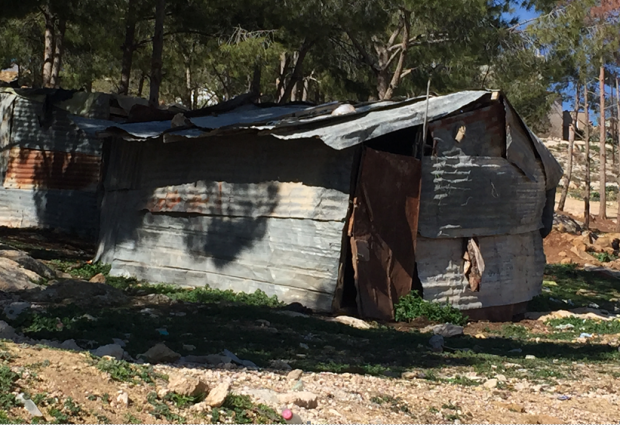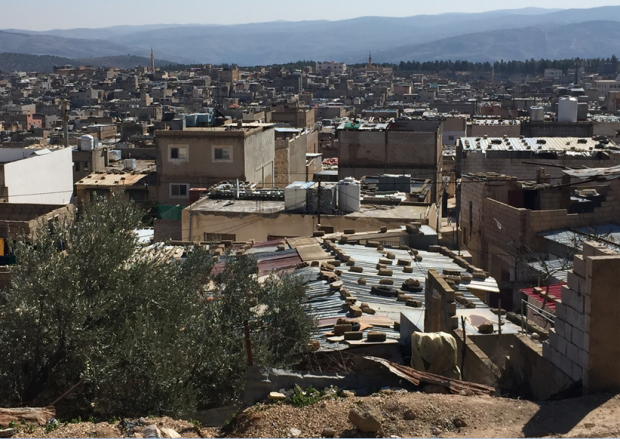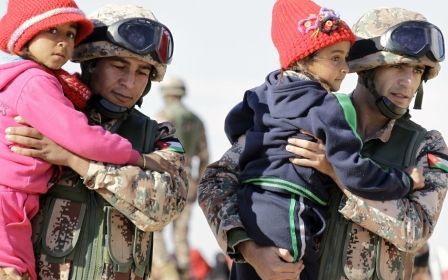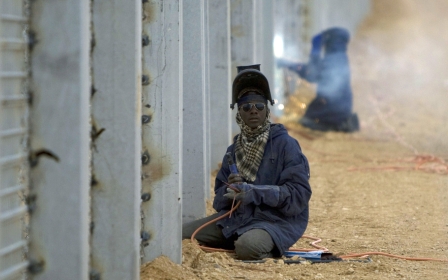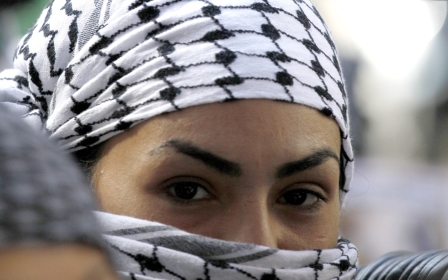Jordan's mixed plans for its Palestinian 'guests'
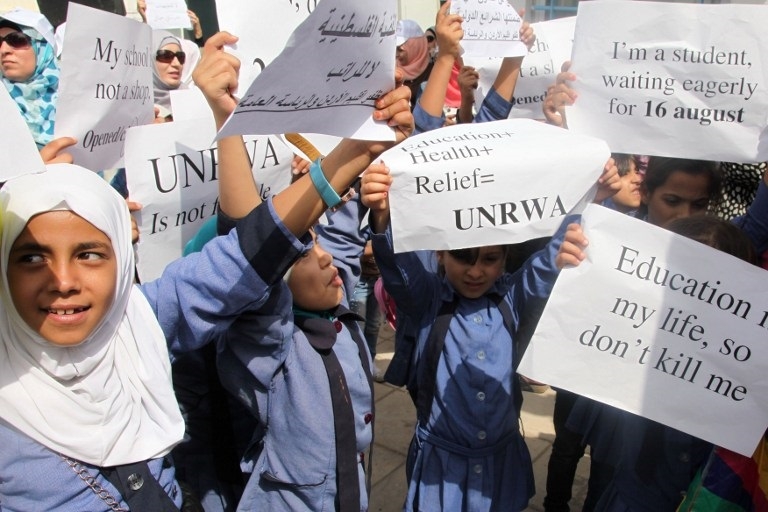
AMMAN - The meeting hall was packed. The speeches welcoming a delegation of British MPs were fulsome and bordered on the raucous. Further contributions from the floor had to be restrained.
The same greeting had been given many times before to foreign visitors of Prince El-Hassan camp, a showcase Palestinian refugee camp in Amman.
A government official intoned the statistics of Jordan’s burden. There were 2.4 million Palestinians in the country, 18 percent of whom live in 13 camps and 95 percent of whom had citizenship and a Jordanian passport. All of this cost the kingdom - and here the official comes finally to his point - $1bn a year.
A Palestinian speaker provided the official thanks: “As Palestinians, we live in Jordan as one family. We don’t have this feeling of being a refugee, because we have the full support of our brothers and sisters east of the River Jordan.
“But we don’t want to stay here. We want to go back to our villages and cities in Palestine. The people on the street, the government, His Majesty the King, all support the right of return. They refuse all solutions which lead to the Palestinians staying in Jordan,” he added.
A boy was led to the microphone: “My name is Mohammed Khamis and I live in a refugee camp in Amman. My uncle is from Palestine. My grandpa is from Palestine. We will return. We will return. Long live Palestine.”
That was the official message, spoken in a hall bearing the ubiquitous portraits of the three generations of Hashemite rulers - King Hussein, King Abdullah and Crown Prince Hussein.
The reality of the kingdom’s relationship with its permanent “guests”, however, is more complex and full of tensions. Mixed into it are other, less welcoming signals.
Just after the MPs departed, a demonstration emerged outside parliament. These are rare events as Jordan lives under the watchful and active eye of its security services. I asked Mahmoud Aqrabawi, director general for Palestinian affairs in the government what the demonstration was about.
He seemed reluctant to explain: “It’s just a debate about a proposal. No decision has been taken,” he mumbled.
It turned out to be more than that. Four years ago, the government issued a decree stating that foreign workers - of whom Jordan has many - should pay for a work permit every year.
The Palestinians took no notice. The government often passes laws it does not enact. But that changed when it announced last month that the law applied retrospectively to Palestinian refugees from Gaza, a group that does not have Jordanian citizenship. Not only did they have to apply for this permit, authorities said, but they now had to pay for the last four years as well.
Overnight 160,000 Palestinians, the majority of whom had been in Jordan since the 1967 war, were no longer being seen by the Jordanian government as refugees, even though they were registered with the United Nations Relief and Works Agency (UNWRA).
Some 70 percent of Gazans in Jordan were born there but they would now be considered as foreign workers.
In theory, they could be deported, like Egyptians, Yemenis and Libyans. But where to? The decree created an instant scandal.
It is not as if Gazans had many rights to start with. Unlike Palestinians from the West Bank, Jordan considers Gaza pre-67 as Egyptian territory. In Jordan, Gazans cannot get a national ID number and a passport. They are barred from working in the public sector. Whole industries in the private sector are also off limits: finance, banking, tourism. For all other work, special permission has to be obtained from the security services.
Even a highly coveted qualification like a certificate in education, a pharmacy or an engineering degree cannot secure you employment.
Gazans cannot be a member of a trade union or open a GP practice.
This means they get cheap, unskilled manual work, in agriculture (most of Jordan is desert) or construction, if they get any work at all.
Harsh reality in Jarash camp
The least welcome of Jordan’s Palestinian refugees end up in a camp in the mountains of Jarash, over 60 kilometres north of the capital.
Jarash’s distress could be glimpsed from the hills above it. Between 35,000 and 40,000 people lived in little more than a square kilometre under tin roofs or plastic sheeting held in place by loose bricks. When it snows, charity workers go from house to house with metal staves to prop up the collapsing structures but Jarash is not for the faint hearted in any climate.
Fatima al-Khateebm collects water from the holes in her roof to avoid using the expensive tap water, and gets two dinars ($3) every three days from selling bread in the market.
“I don’t have any income. My husband is disabled. If I want to let my son or daughter work, they say you are Palestinian, not Jordanian,” she said.
I asked her whether she received any money from the government. Her reply is echoed throughout the camp: “The government takes money from me and asks me to pay more.”
Her son Yousef had just left hospital after an operation on his lung. For Jordanian citizens, the operation would have been free. For Yousef, it cost 750 dinars ($1,000), which he had to borrow from friends.
“I had to have an X-ray. A Jordanian citizen pays one quarter of one dinar,” Fatima said.
“I had to pay 44 ($60) dinars. When my son was sick, I knew I could not treat him in hospital. So I prayed for him and it worked. There is no help from people. There is help from God.”
Khaled Abu Abdullah, the manager of the charity Human Appeal International for the camp took us to another house where a family of seven was living in one room, the bedding piled up around the walls.
He questioned the woman inside closely about what they had to eat that morning. He said: “All this family live in one room. Father, mother, sons. She does not have any income and don’t have any support.”
I asked her what she was doing for lunch and she said she did not have anything. I asked her what she had for breakfast. She insisted they had a proper breakfast, but refused to say what she ate.
Some camp residents may seem better off, but hardship is ubiquitous. The house of Abdulhakeem Abdullah, a retired teacher in the UNRWA school at the camp, had books but he said he has no money to pay the electricity bill. Instead his heating comes from one gas bottle that also feeds the stove and allowed them to do all their cooking.
“Education is more important than food,” Abdulhakim said. But the family’s battle to get their children educated is gargantuan.
“We don’t buy food. We spend what we have on getting our daughter Nayila to college every day. She has to pay 6 dinars ($8.50) for the bus from Jarash to Amman.”
Mohammed, his son, has been studying business administration in Irbid University, some 20 kilometres north from the camp, for the last seven years. Every time the family runs out of money, has to stop. When his family spoke to MEE, he had to find nearly 1,000 dinars ($1,500) to start studying again.
His brother Ayman had to stop his engineering two years ago and had just received a letter from the university. If he did not pay the fees, he would lose his place, he was told.
Twelve people share Adulhakeem’s house. Four have BA certificates but all were destitute. The family owed 245 dinars ($350) in unpaid electricity bills.
Educational achievements of Jarash camp are high. Every year, the king announces as a “gift” 200 university seats for the Palestinian population - whether they have a national number or not.
Students from Jarash regularly get awarded places, even though the competition is fierce. But the gift is not monetary and they still have to find the money to pay for the courses.
West Bank vs Gaza
Faraj Shalhoub, assistant editor of the opposition newspaper Assabeel, is a Gazan.
“All Palestinians in Jordan are targeted and all are weak, but some are weaker than others,” he said.
“The government has in the past withdrawn citizenship from Palestinian people. So most Palestinians are afraid to pressurise or to show solidarity with refugees from Gaza. There is discrimination against Palestinians in Jordan, their presence in state institutions is very low.”
The status of Palestinians in Jordan was a political football between competing power centres within the Jordanian government, Shalhoub said.
“There are two power centres in the regime, pro and anti-Palestinians. Both groups make life harder for Gazans, some of them because they discriminate against all Palestinian people and some of them because they want to make life easier for non-Gazan Palestinians.”
The relationship between Palestinians and Jordanians is an uneasy balancing act.
A Palestinian, speaking on condition of anonymity, said: “The real problem is that Palestinians do not engage in political life, because they have their passport and their job and they don’t want a conflict with Jordanians.”
He said the unspoken pact went something like this: “You give us the right to work, you can have your security forces, your army and do what you want. If you interfere with our life, things will change. Sometimes the government uses the same argument on us: if you want to change the election law, think about the security of the country you live in.”
For now, the government has withdrawn the demand for four years back payment, but insist on Gazans applying for a work permit from now on. Down the line the plan could be revived and the next step is to introduce residency cards for Gazans.
One resident of Jarash said: “I came from Bersheva [in modern-day Israel] in 1948. They took my land and I moved to Gaza. I had to leave Gaza for Jordan in 1967. I have been here for 39 years, and now they tell me I am from Gaza. I am not a Jordanian but I am very, very tired.”
New MEE newsletter: Jerusalem Dispatch
Sign up to get the latest insights and analysis on Israel-Palestine, alongside Turkey Unpacked and other MEE newsletters
Middle East Eye delivers independent and unrivalled coverage and analysis of the Middle East, North Africa and beyond. To learn more about republishing this content and the associated fees, please fill out this form. More about MEE can be found here.


